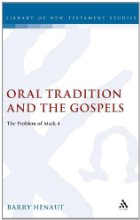 Barry W. Henaut argues that the scholarly belief that “an extensive oral tradition existed behind the Gospels” has been essentially taken for granted rather than argued. In Oral Tradition and the Gospels: The Problem of Mark 4 Henaut introduces his study with reference to what even secular historians claim they can “know” about Jesus. Historian Michael Grant in Jesus, an historian’s review of the Gospels acknowledges the “certain fact” that Jesus taught his followers to love God and love their neighbours:
Barry W. Henaut argues that the scholarly belief that “an extensive oral tradition existed behind the Gospels” has been essentially taken for granted rather than argued. In Oral Tradition and the Gospels: The Problem of Mark 4 Henaut introduces his study with reference to what even secular historians claim they can “know” about Jesus. Historian Michael Grant in Jesus, an historian’s review of the Gospels acknowledges the “certain fact” that Jesus taught his followers to love God and love their neighbours:
[A]mong the host of Commandments Jesus singled out two as supreme, Love of God and of our neighbour. This pairing of the two ordinances in absolute priority over all other injunctions occurs elsewhere in Jewish thought after the [Hebrew Bible] and may not, therefore, be Jesus’ original invention. But the stress he laid on it was unprecedentedly vivid.
Henaut recognizes immediately that the secular historian is merely following outdated theologians in order to argue for the historical certainty of this little datum about Jesus:
What could be more Christ-like than the Golden Rule? The forcefulness of this aphorism, particularly in the Sermon on the Mount, for many captures the essence of Jesus. Michael Grant seems to be engaged, not so much in the historian’s craft, but rather in stating the obvious.
But times change. A dozen years later the Jesus Seminar would overwhelmingly deem the Golden Rule an inauthentic saying.
In light of the extensive literary parallels from Hinduism, Buddhism, Confucianism, Zoroastrianism and Judaism there is no way of knowing whether Jesus ever uttered this aphorism. The early Christian community had access to a variety of sources for this sentiment and may have ascribed it to Jesus at any time prior to the Gospels. What initially looked self-evident now becomes a victim of what Van A. Harvey calls the morality of historical knowledge. Grant’s presentation has become a self-fulfilling prophecy. The vivid presentation of Jesus in the Gospel narrative, which Grant recognizes to be a secondary composition, nevertheless has formed the basis of his reconstruction.
Grant has filtered the Gospels through the hermeneutics of C.H. Dodd and J. Jeremias, a method that is now outdated. (p. 13, my bolding)
Henaut continues. This is not just a problem for the Golden Rule. It is a paradigm for the problem with the assumption that oral tradition lies behind the Gospels in every other way, too.
What would it mean if we did allow that the Golden Rule or love of neighbour really was taught by Jesus? What would this tell us about his teaching? After all, we find the same teaching in the curricula of:
- Tobit
- Isocrates
- Aristotle
- Epictetus
- Thomas Hobbes
- Whatsover you require that others should do to you, that do ye to them.
- Benedict de Spinoza
- John Locke
- Immanuel Kant
- John Stuart Mill
- To do as one would be done by, and to love one’s neighbour as one’s self, constitute the ideal perfection of utilitarian morality.
Was Jesus more like a first-century Aristotle, Immanuel Kant or John Stuart Mill?
What’s worse, the Golden Rule can scarcely be found among any two of its many different exponents in exactly the same wording. Differences of wording have been attributed to faulty memories struggling to pass on oral traditions. Does oral tradition account for the differences in wording among the above?
Is not literary transmission meant to enable fixed forms of a saying through the generations? If so, why are there so many variant forms of the saying? Had Hobbes, Spinoza, Locke, Kant and Mill never encountered the saying in literature before?
Henaut’s book is a revised edition of his doctoral dissertation that was accepted at the University of Toronto in 1991. In it he argues what probably many of us have half-guessed at some time or other — that it is impossible to ascribe any saying to any particular individual, including Jesus, of a pre-textual era.
The very “communal, anonymous and changeable nature of [the oral] medium makes it impossible to trace a tradition’s history through this [oral] transmission.
And,
It is impossible to exclude some kind of literary relationship among . . . various strands of [Jesus sayings] tradition despite the fact that most scholars believe them to be independent.
